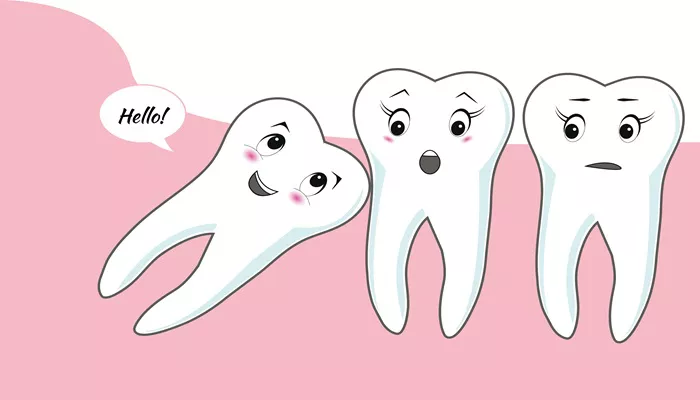Wisdom teeth, also known as third molars, are the last set of molars that typically emerge in the late teens or early twenties.
For some people, these teeth grow in without any problems, aligning properly with the rest of the teeth. However, for many others, wisdom teeth can cause complications such as crowding, pain, or infection. Knowing whether your wisdom teeth are growing correctly is essential for maintaining good oral health and preventing potential dental issues.
In this article, we will discuss the signs of proper wisdom tooth growth, common issues that may arise, and when to seek professional dental care. By understanding these factors, you can take the necessary steps to ensure that your wisdom teeth develop healthily.
Signs That Your Wisdom Tooth Is Growing Correctly
1. Proper Alignment with Other Teeth
A correctly growing wisdom tooth should align with the neighboring teeth. It should emerge in a straight and upright position, allowing for normal biting and chewing functions. If your wisdom teeth are growing in a way that matches the natural alignment of your teeth, they are likely developing correctly.
2. No Pain or Discomfort
If your wisdom teeth are growing properly, you should not experience persistent pain or discomfort in the back of your mouth. While some mild soreness may occur as the tooth emerges, this should subside within a few days. Severe or prolonged pain could indicate a problem, such as impaction or infection.
3. No Swelling or Redness
Healthy wisdom tooth growth should not cause noticeable swelling or redness in the gums. If your gums appear normal and are not inflamed, this is a good sign that your wisdom teeth are growing without issues. However, if you notice persistent swelling, it could be a sign of infection or irritation.
4. No Difficulty in Opening Your Mouth
A properly growing wisdom tooth should not interfere with your ability to open and close your mouth comfortably. If you experience stiffness or difficulty in jaw movement, it may indicate a problem, such as an impacted tooth pressing against the jawbone.
5. No Bad Breath or Unpleasant Taste
A correctly growing wisdom tooth should not contribute to chronic bad breath or a persistent bad taste in your mouth. If you notice these symptoms, it may indicate food debris getting trapped around a partially erupted tooth, leading to bacterial growth and infection.
Common Issues That Indicate Improper Wisdom Tooth Growth
1. Impacted Wisdom Tooth
An impacted wisdom tooth is one that fails to fully emerge from the gum line due to lack of space or improper angling.
Symptoms of an impacted wisdom tooth include:
- Severe pain at the back of the mouth
- Swollen and tender gums
- Difficulty in opening the mouth
- Persistent bad breath
2. Crowding or Shifting of Teeth
If your wisdom teeth do not have enough space to grow properly, they may push against the neighboring teeth, leading to crowding or misalignment. This can cause discomfort and may require orthodontic treatment to correct the issue.
3. Gum Infection (Pericoronitis)
When a wisdom tooth partially erupts, it can create a flap of gum tissue where food particles and bacteria become trapped.
This can lead to pericoronitis, a painful gum infection characterized by:
- Red, swollen, or bleeding gums
- Difficulty chewing or swallowing
- Pus discharge near the affected area
4. Cyst Formation
In some cases, a wisdom tooth that does not fully emerge may develop a fluid-filled sac called a cyst. If left untreated, cysts can damage surrounding teeth, gums, and bone structure, leading to more serious complications.
5. Damage to Nearby Teeth
An improperly positioned wisdom tooth may press against adjacent molars, causing enamel erosion, cavities, or weakening of the surrounding teeth. This can lead to increased sensitivity and a higher risk of tooth decay.
When to See A Dentist
If you suspect that your wisdom teeth are not growing correctly, it is important to consult a dentist. You should seek professional evaluation if you experience any of the following:
- Persistent or severe pain
- Swollen or bleeding gums
- Difficulty in chewing or speaking
- Signs of infection, such as fever or pus discharge
- Noticeable shifting of teeth or bite changes
A dentist can examine your mouth and take X-rays to determine the position of your wisdom teeth. If necessary, they may recommend treatment options such as monitoring, cleaning adjustments, or removal of the wisdom teeth to prevent complications.
Conclusion
Wisdom teeth can grow correctly in some individuals, but for many, they may cause dental problems that require attention.
By recognizing the signs of proper wisdom tooth growth and being aware of potential issues, you can take proactive steps to maintain oral health. If you experience any discomfort or symptoms of improper growth, it is best to seek professional dental care promptly. Regular dental check-ups and good oral hygiene practices can help ensure that your wisdom teeth do not lead to unnecessary complications.

